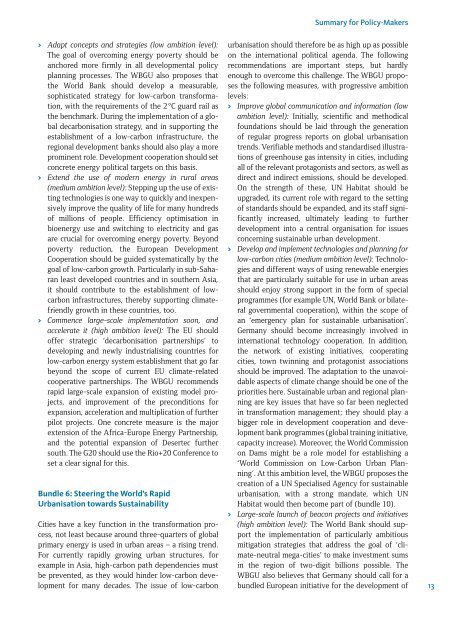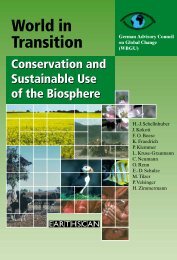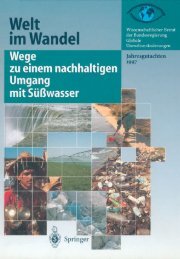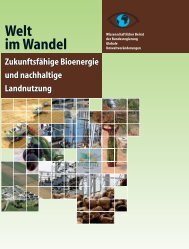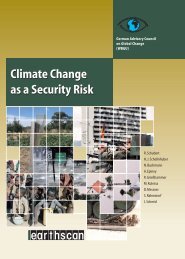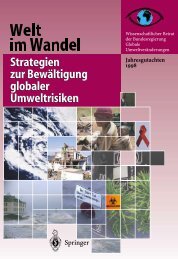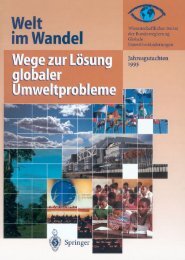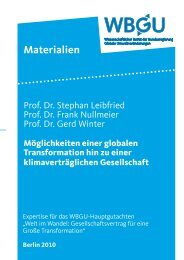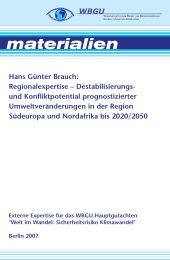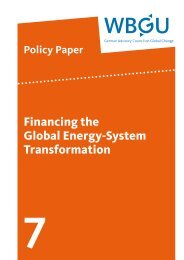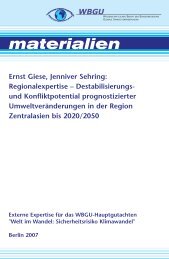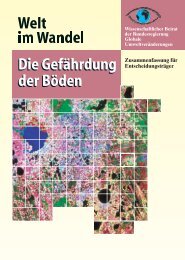World in Transition: A Social Contract for Sustainability - WBGU
World in Transition: A Social Contract for Sustainability - WBGU
World in Transition: A Social Contract for Sustainability - WBGU
You also want an ePaper? Increase the reach of your titles
YUMPU automatically turns print PDFs into web optimized ePapers that Google loves.
Adapt concepts and strategies (low ambition level):<br />
The goal of overcom<strong>in</strong>g energy poverty should be<br />
anchored more firmly <strong>in</strong> all developmental policy<br />
plann<strong>in</strong>g processes. The <strong>WBGU</strong> also proposes that<br />
the <strong>World</strong> Bank should develop a measurable,<br />
sophisticated strategy <strong>for</strong> low-carbon trans<strong>for</strong>mation,<br />
with the requirements of the 2 °C guard rail as<br />
the benchmark. Dur<strong>in</strong>g the implementation of a global<br />
decarbonisation strategy, and <strong>in</strong> support<strong>in</strong>g the<br />
establishment of a low-carbon <strong>in</strong>frastructure, the<br />
regional development banks should also play a more<br />
prom<strong>in</strong>ent role. Development cooperation should set<br />
concrete energy political targets on this basis.<br />
> Extend the use of modern energy <strong>in</strong> rural areas<br />
(medium ambition level): Stepp<strong>in</strong>g up the use of exist<strong>in</strong>g<br />
technologies is one way to quickly and <strong>in</strong>expensively<br />
improve the quality of life <strong>for</strong> many hundreds<br />
of millions of people. Efficiency optimisation <strong>in</strong><br />
bioenergy use and switch<strong>in</strong>g to electricity and gas<br />
are crucial <strong>for</strong> overcom<strong>in</strong>g energy poverty. Beyond<br />
poverty reduction, the European Development<br />
Cooperation should be guided systematically by the<br />
goal of low-carbon growth. Particularly <strong>in</strong> sub-Saharan<br />
least developed countries and <strong>in</strong> southern Asia,<br />
it should contribute to the establishment of lowcarbon<br />
<strong>in</strong>frastructures, thereby support<strong>in</strong>g climatefriendly<br />
growth <strong>in</strong> these countries, too.<br />
> Commence large-scale implementation soon, and<br />
accelerate it (high ambition level): The EU should<br />
offer strategic ‘decarbonisation partnerships’ to<br />
develop<strong>in</strong>g and newly <strong>in</strong>dustrialis<strong>in</strong>g countries <strong>for</strong><br />
low-carbon energy system establishment that go far<br />
beyond the scope of current EU climate-related<br />
cooperative partnerships. The <strong>WBGU</strong> recommends<br />
rapid large-scale expansion of exist<strong>in</strong>g model projects,<br />
and improvement of the preconditions <strong>for</strong><br />
expansion, acceleration and multiplication of further<br />
pilot projects. One concrete measure is the major<br />
extension of the Africa-Europe Energy Partnership,<br />
and the potential expansion of Desertec further<br />
south. The G20 should use the Rio+20 Conference to<br />
set a clear signal <strong>for</strong> this.<br />
Bundle 6: Steer<strong>in</strong>g the <strong>World</strong>’s Rapid<br />
Urbanisation towards Susta<strong>in</strong>ability<br />
Cities have a key function <strong>in</strong> the trans<strong>for</strong>mation process,<br />
not least because around three-quarters of global<br />
primary energy is used <strong>in</strong> urban areas – a ris<strong>in</strong>g trend.<br />
For currently rapidly grow<strong>in</strong>g urban structures, <strong>for</strong><br />
example <strong>in</strong> Asia, high-carbon path dependencies must<br />
be prevented, as they would h<strong>in</strong>der low-carbon development<br />
<strong>for</strong> many decades. The issue of low-carbon<br />
Summary <strong>for</strong> Policy-Makers<br />
urbanisation should there<strong>for</strong>e be as high up as possible<br />
on the <strong>in</strong>ternational political agenda. The follow<strong>in</strong>g<br />
recommendations are important steps, but hardly<br />
enough to overcome this challenge. The <strong>WBGU</strong> proposes<br />
the follow<strong>in</strong>g measures, with progressive ambition<br />
levels:<br />
> Improve global communication and <strong>in</strong><strong>for</strong>mation (low<br />
ambition level): Initially, scientific and methodical<br />
foundations should be laid through the generation<br />
of regular progress reports on global urbanisation<br />
trends. Verifiable methods and standardised illustrations<br />
of greenhouse gas <strong>in</strong>tensity <strong>in</strong> cities, <strong>in</strong>clud<strong>in</strong>g<br />
all of the relevant protagonists and sectors, as well as<br />
direct and <strong>in</strong>direct emissions, should be developed.<br />
On the strength of these, UN Habitat should be<br />
upgraded, its current role with regard to the sett<strong>in</strong>g<br />
of standards should be expanded, and its staff significantly<br />
<strong>in</strong>creased, ultimately lead<strong>in</strong>g to further<br />
development <strong>in</strong>to a central organisation <strong>for</strong> issues<br />
concern<strong>in</strong>g susta<strong>in</strong>able urban development.<br />
> Develop and implement technologies and plann<strong>in</strong>g <strong>for</strong><br />
low-carbon cities (medium ambition level): Technologies<br />
and different ways of us<strong>in</strong>g renewable energies<br />
that are particularly suitable <strong>for</strong> use <strong>in</strong> urban areas<br />
should enjoy strong support <strong>in</strong> the <strong>for</strong>m of special<br />
programmes (<strong>for</strong> example UN, <strong>World</strong> Bank or bilateral<br />
governmental cooperation), with<strong>in</strong> the scope of<br />
an ‘emergency plan <strong>for</strong> susta<strong>in</strong>able urbanisation’.<br />
Germany should become <strong>in</strong>creas<strong>in</strong>gly <strong>in</strong>volved <strong>in</strong><br />
<strong>in</strong>ternational technology cooperation. In addition,<br />
the network of exist<strong>in</strong>g <strong>in</strong>itiatives, cooperat<strong>in</strong>g<br />
cities, town tw<strong>in</strong>n<strong>in</strong>g and protagonist associations<br />
should be improved. The adaptation to the unavoidable<br />
aspects of climate change should be one of the<br />
priorities here. Susta<strong>in</strong>able urban and regional plann<strong>in</strong>g<br />
are key issues that have so far been neglected<br />
<strong>in</strong> trans<strong>for</strong>mation management; they should play a<br />
bigger role <strong>in</strong> development cooperation and development<br />
bank programmes (global tra<strong>in</strong><strong>in</strong>g <strong>in</strong>itiative,<br />
capacity <strong>in</strong>crease). Moreover, the <strong>World</strong> Commission<br />
on Dams might be a role model <strong>for</strong> establish<strong>in</strong>g a<br />
‘<strong>World</strong> Commission on Low-Carbon Urban Plann<strong>in</strong>g’.<br />
At this ambition level, the <strong>WBGU</strong> proposes the<br />
creation of a UN Specialised Agency <strong>for</strong> susta<strong>in</strong>able<br />
urbanisation, with a strong mandate, which UN<br />
Habitat would then become part of (bundle 10).<br />
> Large-scale launch of beacon projects and <strong>in</strong>itiatives<br />
(high ambition level): The <strong>World</strong> Bank should support<br />
the implementation of particularly ambitious<br />
mitigation strategies that address the goal of ‘climate-neutral<br />
mega-cities’ to make <strong>in</strong>vestment sums<br />
<strong>in</strong> the region of two-digit billions possible. The<br />
<strong>WBGU</strong> also believes that Germany should call <strong>for</strong> a<br />
bundled European <strong>in</strong>itiative <strong>for</strong> the development of<br />
13


